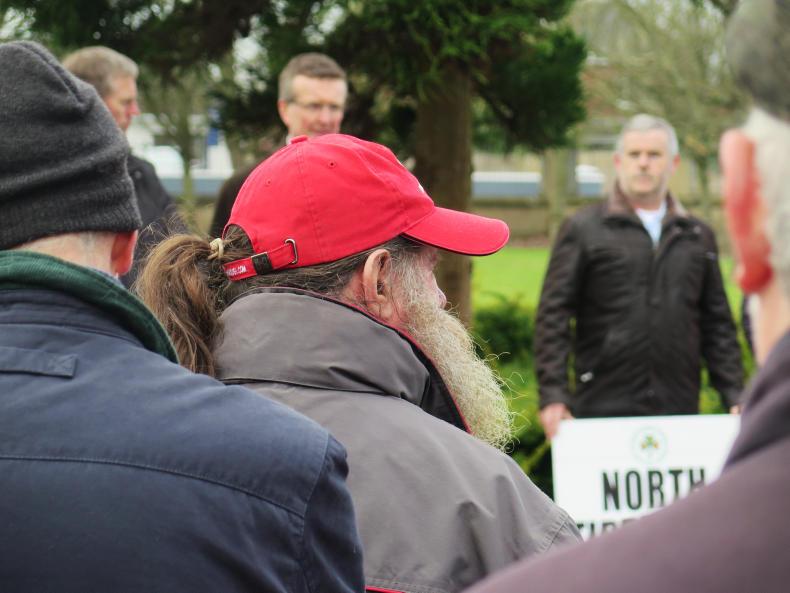Farmers from the Tipperary north IFA branch took to the streets of Nenagh last Thursday in protest over inspections.
Some 300 farmers marched in anger as figures revealed by the Irish Farmers Journal in January show that farmers in north Tipperary and east Clare are receiving disproportionately higher inspections and penalties than other areas.
Figures show that the Department of Agriculture’s Nenagh office carried out an average of 321 inspections in each of the six years to 2015 compared with 299 annually for all other offices. The inspections in north Tipperary resulted in more penalties. Nationally, one-third of the farmers inspected were penalised, while half of the north Tipperary/east Clare farmers inspected got a penalty.
The average penalty was higher for these farmers. Nationally, the average penalty applied over the six years was €880 – for them it was €1,303.
The protest was led by Tipperary north IFA chair Tim Cullinan. The delegation staged a sit-in in the Department until they received a meeting with Department officials. Cullinan confirmed to the Irish Farmers Journal that a meeting will now take place on Thursday 30 March.
“We had to get our voices heard. The figures speak for themselves, farmers in this area have been hit harder and more often than any other farmer in the country with inspections and penalties.
“In Thursday’s meeting we will be calling for a review of the inspections and the penalties in the area and we will be also calling for a review of the way inspections are carried out here. We cannot continue to be targeted,” Cullinan said.

The Irish Natura and Hill Farmers Association (INHFA) added its support to the north Tipperary IFA campaign.
Its national chair, Vincent Roddy, said: “Plans to reform this have being included in the programme for Government but as of yet nothing has happened. [This] is something that has to change irrespective of any objections from Department staff.”
Camera and question
John Bergin, Nenagh
Two years ago I had a Confirmation in the family on a Friday. The inspector rang on the Tuesday saying he would call on the Friday. He told me that he would be on farm at 11 o’clock, he arrived at  12. He got out of his car and told me: “If you want to go, I’ll do the inspection on my own.” You don’t know when you’re going to have a lad in your yard. I have five in my family and I’m only a small farmer with 50 acres, trying to make a living out of that and rear a family.
12. He got out of his car and told me: “If you want to go, I’ll do the inspection on my own.” You don’t know when you’re going to have a lad in your yard. I have five in my family and I’m only a small farmer with 50 acres, trying to make a living out of that and rear a family.
Eamonn Cleary, Nenagh
We’ve had inspections and we’ve had follow-up inspections. At the end of the follow-up inspection, he couldn’t even tell us how we got on. He just hit me with a flippant remark that it was “going to be a 1% penalty anyway”.
It’s the fear and the unknown, the power that these guys have to come in and literally take money out of our pockets.
Jack Bayly, Nenagh
I had a REPS inspection on the day my mother died. I think he sort of said ‘condolences’ and then the next question was: “Where are the bird boxes?” He continued for the day and I went back to my family, to the undertakers and all the rest of it.
I just feel if that’s the attitude of these people and they don’t know better, then the Department should be looking at themselves very carefully.
Department response
“Irish farming receives over €1.4bn per annum in direct payments. Payments under various schemes are subject to compliance by the beneficiaries with the relevant EU regulations and the specific terms and conditions of the schemes. In accordance with the requirements of EU regulations, inspections are carried out at farm level by trained Department staff to ensure compliance by the beneficiaries and consistency in the outcome. Selection of farms for inspection can be random or risk based. Where non-compliances are determined, a penalty may apply to payments on a sliding scale; the level of penalties is on average each year, quite small. The level of penalty varies across each county depending on land type, intensity of farming, etc. In the event of a penalty, the beneficiary has recourse to an internal Departmental review of the decision should he/she wish to challenge the outcome of an inspection. Furthermore, the beneficiary can refer the matter to the Agricultural Appeals Office who will carry out an independent review of any decision. Finally, the beneficiary can also refer the matter to the office of the Ombudsman should he/she wish to challenge the decision of the Agricultural Appeals Office”.
Listen to "Farmers protest against excessive farm inspections Tipperary" on Spreaker.






 This is a subscriber-only article
This is a subscriber-only article













SHARING OPTIONS: